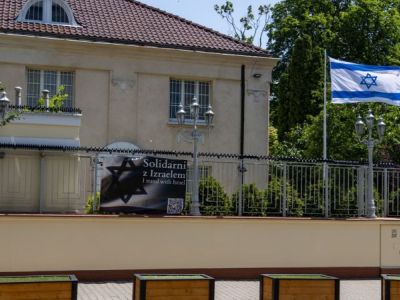Lebanon should not be part of the U.S.-led international coalition fighting terrorism because “America is the mother of terrorism,” the leader of Hezbollah said in a televised speech Tuesday night.
Sayyed Hasan Nasrallah also said his group opposed U.S. military intervention in Syria, including airstrikes on IS targets.
Declaring that Lebanon was capable to confront terrorism alone, he said the government should negotiate with Islamist militants holding at least 21 Lebanese soldiers and policemen hostage from a position of strength, warning that negotiating from a weak position would lead to a catastrophe.
“We are against Lebanon’s participation in the U.S.-led coalition. The U.S. isn’t qualified morally to lead an anti-terrorism coalition,” Nasrallah said in the speech aired on Hezbollah’s Al-Manar TV station. “In our view, America is the mother of terrorism and the cause of terrorism in this world. It is the absolute supporter of the Zionist state of terrorism.”
He added that America had created or helped create terrorist groups which the global coalition was now seeking to fight in Iraq and Syria.
“We reject that Lebanon be part of the international coalition. It is not in Lebanon’s interest to be part of this coalition. There are risks for Lebanon if it joins this coalition,” Nasrallah said.
“Everyone knows that Hezbollah is against IS and takfiri groups and is fighting them. The groups that kill and slaughter pose a threat to all the peoples of this region,” he said. “However, that doesn’t mean we support U.S. military intervention in the region. Hezbollah is against any U.S.-led international coalition that uses terrorism as an excuse for a military intervention in Syria and Iraq.”
“We are against American military intervention and an international coalition in Syria, whether that [action] is against the Syrian regime or Daesh,” Nasrallah said, using the Arabic acronym for IS.
“Under the false pretext of fighting terrorism the U.S. seeks to take control of the region,” he said.
Nasrallah’s speech came hours after the United States and its Arab allies bombed Syria for the first time, killing scores of IS fighters and members of a separate Al-Qaeda-linked group, opening a new front against militants by joining Syria’s three-year-old civil war.
The formation of the global coalition to fight IS militants who have seized large swaths in Iraq and Syria was endorsed during a meeting of the coalition’s foreign ministers in the Saudi city of Jeddah earlier this month. The U.S won backing for the coalition from 10 Arab countries, including Lebanon.
Nasrallah argued that some countries in the coalition were still supporting, funding and arming terrorist groups, including IS.
He urged the coalition’s member states to stop the financing and arming of “terrorist groups that are targeting Lebanon” and to accelerate the delivery of weapons to the Lebanese Army to help in the battle against terrorism.
Despite deep political differences and polarization between the March 8 and March 14 parties, Nasrallah said Lebanon was strong and capable of confronting terrorist groups. “The Lebanese people, through their Army, are able to defend and protect their country from terrorist threats,” he said.
Responding to a statement by Sheikh Sirajuddine Zureiqat, a spokesman of Al-Qaeda-affiliated group, the Abdullah Azzam Brigades, who threatened to come to Beirut in a few days after IS captured large swaths in Iraq and Syria, Nasrallah said: “You cannot come to Beirut or any other place because the Lebanese are capable of confronting any terrorist threat. No one can threaten to invade [Beirut]. We will shoulder our responsibility.”
Referring to the thorny issue of Lebanese soldiers and policemen captured by IS and Nusra Front militants during last month’s fierce clashes with the Lebanese Army in the northeastern town of Arsal, Nasrallah rejected accusations that Hezbollah opposed negotiations with the militants to secure the release of the hostages. He urged the government to negotiate with the militants through intermediaries from a position of strength.
He also called on rival factions to keep the hostage ordeal away from their political bickering and rivalry. Nasrallah said the soldiers’ kidnappers were playing with the country’s fate in view of the confusion within the government over how to approach the hostage crisis.
“Lebanon has been experiencing real humiliation for weeks because of the political performance of several political parties. The continued political one-upmanship will not lead to a solution to this problem,” he said. “For the sake of the Army, the country and the people, we hope that this [hostage] issue be kept away from political one-upmanship and settlement of scores.”
Nasrallah stressed that negotiating from a position of strength would help secure the release of the soldiers and policemen, warning that negotiating from a weak position would lead to a catastrophe.
“We call for negotiation from a position of strength. The Lebanese government is aware of the positions of strength it has,” he said.
Nusra Front and IS militants are still holding at least 21 Lebanese soldiers and policemen. The government has been involved in indirect negotiations with the militant groups through Qatari-sponsored mediation, but has recently announced the suspension of these efforts in response to last week’s execution of Mohammad Maarouf Hammieh by Nusra Front militants and threats to execute more servicemen.
Nasrallah confirmed that Hezbollah was open to negotiations with militants over the release of the captives, underlining that the party “has never rejected the principle of negotiations.”
Nasrallah condemned the wave of sectarian kidnappings that swept the Bekaa region following the execution of three captive soldiers by IS and Nusra Front militants. He warned that the kidnappings served the goals of the militants who were seeking to incite sectarian strife.
“Kidnappings serve the goals of the terrorists who aim to spark sectarian strife in in Lebanon. They want to move the battle to Lebanon,” he said.










